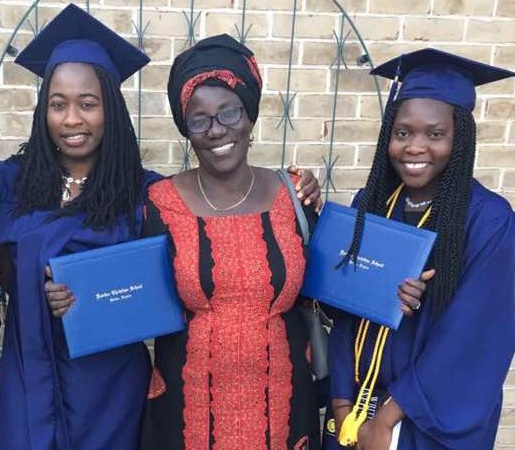


Chibok abduction survivors graduate from US varsities
Two survivors of the 2014 Boko Haram abduction of 276 girls in Chibok, Nigeria, have graduated from tertiary institutions in the United States.
Patience Bulus and Mercy Ali Paul, who were among the girls kidnapped by the terrorist group, have successfully completed their studies in the US, thanks to scholarships from the Murtala Muhammed Foundation (MMF) and Victims Support Fund.
Patience graduated from Dickinson College with a major in Gender Studies and Religion, while Mercy earned an Associate Degree in Social Science from Northern Virginia Community College (NOVA).
The two women’s journey to graduation was made possible through a partnership between MMF and VSF, which provided full scholarships and personal growth opportunities to the rescued Chibok girls, enabling them to pursue higher education at renowned universities in the US.
Patience’s academic achievements were further recognised with her induction as an Honorable Member of the National Society of Leadership and Success at Dickinson College in 2021.
Meanwhile, Aisha Muhammed-Oyebode, the founder and chief executive officer of Murtala Muhammed Foundation speaking at Patience’s graduation in Carlisle Pennsylvania, USA, said, “The abduction of 276 schoolgirls 10 years ago from their boarding school signalled the urgency of action to secure education for girls in Nigeria.
“As an organisation with a vision to advance positive education and social outcomes for women, we celebrate Patience and Mercy’s achievements today as a powerful example of resilience and their determination not to be defined by the past but focused on the future.
“Many more girls in Chibok and other conflict-affected communities deserve this opportunity so today we are calling for immediate action at the local and global levels to enable access to quality education and build self-reliance in conflict-affected communities.”
Muhammed-Oyebode pointed out that with 91 girls in captivity, many of the Chibok schoolgirls have returned as mothers. She frowned at the fact that rape, coercion, and extremism are often weapons of war; hence she said that the need to protect women and girls must not be ignored.
“Sexual slavery/reproductive health is at heightened risk in conflict zones,” she noted.
Sharing their inspirational journey to completing their education, Mercy Ali Paul said, “Graduating feels like a dream I never thought would come true. Ten years ago, I was just hoping to survive the nightmare of abduction.
“Each moment I spent with Boko Haram was filled with fear and uncertainty, but my faith kept me strong. I finally escaped and became determined to reclaim my life after that.
“I knew education was the key to rebuilding my future, and now with this diploma, I feel empowered. My journey has been challenging, but the support from my family, friends, and sponsoring organisations from Nigeria made it possible.
“I hope my story inspires other girls in Nigeria and around the world to never give up, no matter how dark their circumstances may seem.”
Patience Bulus said, “Walking across this stage today is more than just receiving a diploma; it’s a testament to resilience and hope. Ten years ago, Boko Haram tried to take away our futures, but they couldn’t take away our dreams.
“Today, that I graduate with a degree from a prestigious college, is not just for myself, but for the countless girls who are yet to make it out. This achievement is dedicated to them and the power of community support.
“The encouragement and resources provided by sponsors in Nigeria and others here in the U.S. made this possible. I am excited to use my education to advocate for girls’ rights and education worldwide. Today is proof that with perseverance and support, we can overcome even the most harrowing experiences.”
Meanwhile, ten years after the Chibok abduction incident, insecurity and mass kidnappings in Nigeria are on the rise, causing widespread devastation and posing a significant threat to the economy.
Recent kidnappings underscore the persistent danger faced by young people in conflict zones. These young people urgently need support, including access to education, security, and livelihood restoration.
Strengthening Nigeria’s education system is essential for empowerment, economic progress, and inclusive growth. With a population exceeding 200 million, Nigeria has one of the highest numbers of out-of-school children globally.



